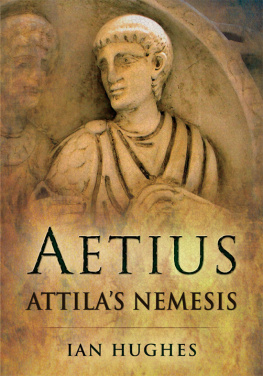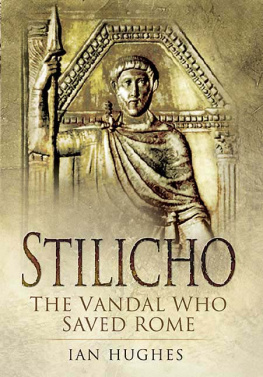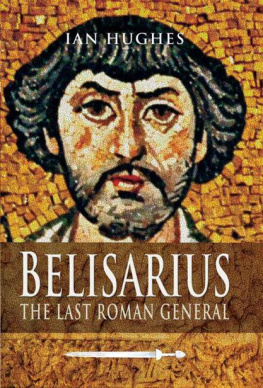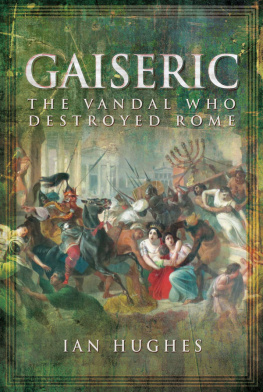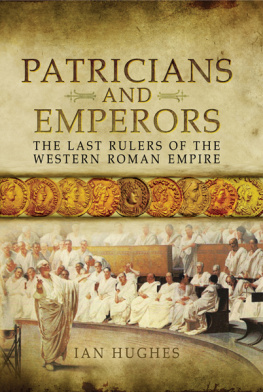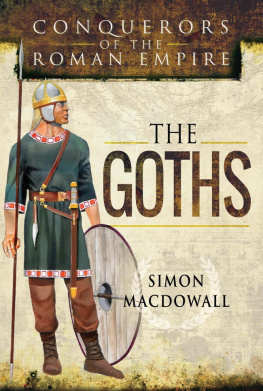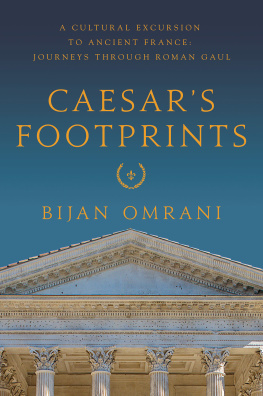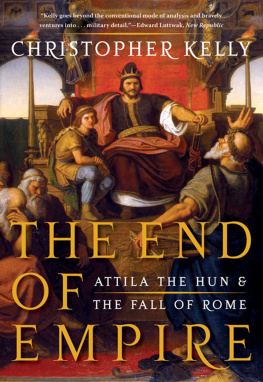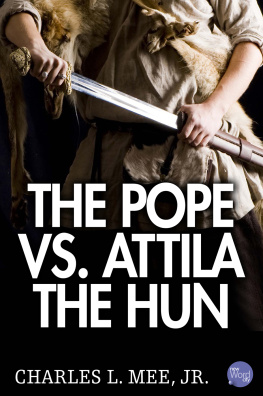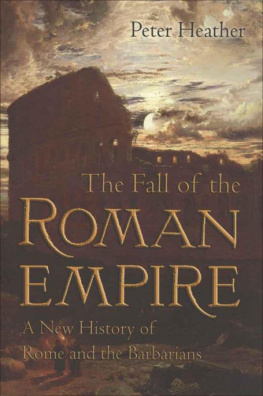Aetius
Attilas Nemesis

First published in Great Britain in 2012 by
Pen & Sword Military
an imprint of
Pen & Sword Books Ltd
47 Church Street
Barnsley
South Yorkshire
S70 2AS
Copyright Ian Hughes, 2012
ISBN: 978-1-84884-279-3
Digigtal Edition ISBN: 978-1-78346-134-9
The right of Ian Hughes to be identified as Author of this Work has been asserted by him in accordance with the Copyright, Designs and Patents Act 1988.
A CIP catalogue record for this book is
available from the British Library.
All rights reserved. No part of this book may be reproduced or transmitted in any form or by any means, electronic or mechanical including photocopying, recording or by any information storage and retrieval system, without permission from the Publisher in writing.
Typeset in 10.5/12.5pt Ehrhardt by
Concept, Huddersfield, West Yorkshire
Printed and bound by
CPI Group (UK) Ltd, Croydon, CRO 4YY
Pen & Sword Books Ltd incorporates the Imprints of Pen & Sword Aviation, Pen & Sword Family History, Pen & Sword Maritime, Pen & Sword Military, Pen & Sword Discovery, Wharncliffe Local History, Wharncliffe True Crime, Wharncliffe Transport, Pen & Sword Select, Pen & Sword Military Classics, Leo Cooper, The Praetorian Press, Remember When, Seaforth Publishing and Frontline Publishing.
For a complete list of Pen & Sword titles please contact
PEN & SWORD BOOKS LIMITED
47 Church Street, Barnsley, South Yorkshire, S70 2AS, England
E-mail:
Website: www.pen-and-sword.co.uk
List of Plates
List of Maps
Acknowledgements
As is usual, my gratitude must go to Philip Sidnell for keeping faith with an unknown author. I hope that this third book continues to repay that confidence.
I would like to thank Adrian Goldsworthy for agreeing to read through early drafts of the entire book. For reading excerpted would like to thank Philip Matyszak. Finally, I would like to express my extreme gratitude to Perry Gray for not only reading the whole manuscript but for taking the time to discuss significant points throughout the process. The comments, criticisms and corrections of the above have been a valuable asset in the writing process. However, it should not be taken for granted that they agree with all that is written here, and for any mistakes that remain I am solely responsible.
For helping me to secure otherwise impossible-to-acquire books, I would once again like to thank the staff at Thurnscoe Branch Library, Barnsley, and especially Andrea World of the Inter-Library Loans Department of Barnsley Libraries.
I would very much like to thank the following people for kindly allowing me to use their photographs in the plates: Beast Coins (www.beastcoins.com), CNG coins (www.cngcoins.com), Giovanni DallOrto of Wikimedia, Sean Pruitt, Didier Rykner, Nigel Rodgers, and Antiquite Tardive of Flickr. Their generosity is very much appreciated.
For their patience and for permission to use photographs from their extensive and valuable libraries I would like to thank Dr Manfred Clauss of ILS, and Dr Andreas Fabender and Dr Manfred G. Schmidt of CIL.
My gratitude also goes to Raffaele DAmato, Roy Boss and Graham Sumner for their correspondence regarding depictions of Aetius in ancient monuments and diptychs, although they may not agree with the conclusions I have drawn.
As with my first two books, this book would not have been the same without the contributions of the members of both www.romanarmytalk.com/rat/ and www.unrv.com.forum. They have yet again been exceptionally patient, especially with regards to questions about the availability of photographs.
My utmost gratitude goes to the individuals and institutions who have made available the ever-growing corpus of source material on the internet. I will, however, refrain from mentioning individuals by name, since a look at the bibliography will show that it would need a separate book to list all of the people involved and to single individuals out for special praise would be unfair.
To all of these people, once again, my heartfelt thanks.
However, most of all I would like to thank Joanna for her endurance in reading through a third book about some bloke from ancient Rome. For her seemingly endless patience and understanding I remain forever in her debt.
Finally, to my son Owen again, I would like to apologize for all of the times when you have wanted to play and been told, Not now, Daddy is working. Unfortunately, this will continue, as I have now signed a deal for another book. Sorry!
Foreword
Historians of the fourth and fifth centuries have a particularly difficult life. Those used to the relative certainties of the late republic and early empire can only look on with admiration at those brave souls who plunge into the mess that is late antiquity.
Mess is not putting it too strongly. Firstly, the Roman Empire itself was in a mess, and particularly so the western empire. A series of barbarian invasions not only tore through the countryside, but also through the social and economic fabric of the affected provinces. The empire was bankrupt, the peasantry surly and mutinous (and often likely to side with the invaders) and the soldiers too few and of dubious loyalty.
Secondly, the evidence is in a mess. Barbarian invasions and civil wars tend to be confusing events even at the time, let alone 1,500 years later, when the historian has to make sense of the fragmentary writings of people who themselves had little idea of what was actually going on. Furthermore, the motives of the main protagonists are often obscure. And that is even if we assume that the actions of the protagonists are accurately reported and dated an assumption any chronicler of late antiquity is likely to greet with sardonic laughter. Documents are scanty and tend to refer even to major events in oblique terms. Entire battles have gone missing. To give but one example, early in the period Britain drifted out of imperial control. One might think this would be significant enough to warrant a detailed description in the primary sources, and perhaps even an analysis of the causes. In reality, the historian of late antiquity settles gratefully for any passing mention.
Thirdly, and most importantly, almost everyone writing in this period had an agenda in which the accurate reporting of events was either irrelevant at best, or at worst something to be avoided at all costs. The sources for this period seldom say what they mean, or mean what they say. Sometimes the motive is political, as when a writer is attempting to praise one emperor at the cost of a rival, or trying to obfuscate his own involvement with that rival. At other times the issue is religious. The fourth and early fifth centuries saw the triumph of Christianity over paganism and much, in fact most, of what we know of the history in that period is seen through the lens of that process.
One consequence of such ideological involvement is that battles are seen as tests of the religious convictions of the generals involved. Writers such as Jerome are apparently convinced that a prayer at the right moment affected events more powerfully than a well-deployed legion. And since Jerome seldom takes interest in the actual deployment of the armies, there is no telling whether he was right. What we do know is that his reports, like those of his contemporaries, must be filtered for bias, poetic exaggeration, hyperbole and plain ignorance.
Furthermore, the religious struggle of the period was a complex affair in which the pagans were sometimes mere interested spectators to vicious in-fighting between catholic Christians, Arians, Monophysites, Donatists and others. It would be fair to say that most historians of the period would gladly sacrifice, say, the minutiae of the struggle against the Pelagian heresy for a proper description of a secular event or two for example, the invasion of Italy by Radagaisus.

